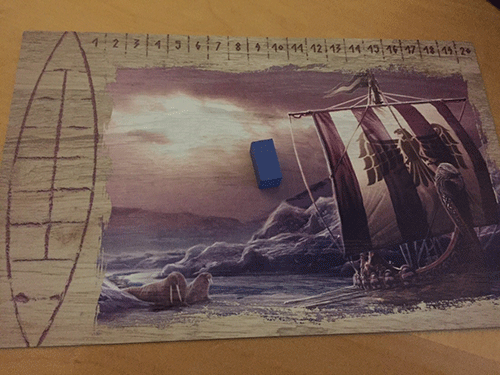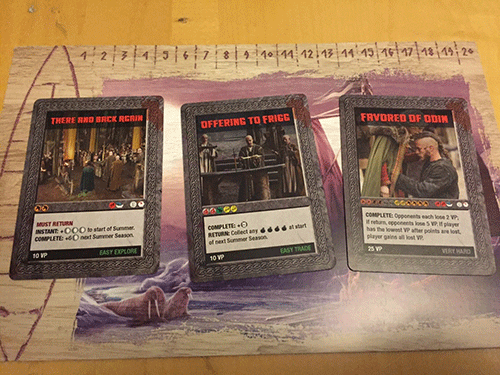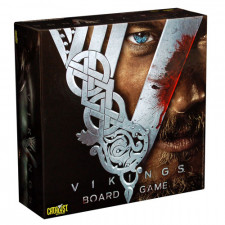Vikings: The Board Game Review
on Jun 16, 2016
Games based on television shows have come a long way in the past decade or so, with incredible hits like Spartacus, Homeland, and Battlestar Galactica proving that licensed products don’t have to suck. What made those games great was that they took the best parts of the shows, distilled them, and built solid mechanics around the license that supported their settings and themes. Sadly, Vikings: The Board Game from Catalyst Game Labs went the other direction; they built a game that has abstracted almost every interesting thing that most people would relate to the show, or even Vikings in general, and create a very dry, mostly uninteresting “spreadsheet†worker placement game. I find it to be similar in many ways to Power $truggle, with two exceptions – Power $truggle is interesting and fun.

To be fair, I wasn’t even aware that there was a Vikings show until I got this game, and after receiving it, I watched a few episodes to familiarize myself with it. All of the card art pieces are stills from the show, such as men looking stoically off into the distance, or women staring at you as if you were an iPhone and they are all about the selfies. It’s typical fare for licensed games, and it works well. What doesn’t work as well is the fact that they created an Agricola clone with virtually no player interaction. Combat is abstracted by making warriors a resource that is lost when you perform raids, for example, and by the way, the only raiding you do is on generic tiles. There’s literally no way to mess with your opponents except to take an action space that they want, and even that is weak in execution because almost all of the action spaces allow for multiple players’ pawns. The physical embodiment of the level of abstraction is that they’ve even made the Longships as rectangular wooden blocks, which we’ve come to call Longblocks. Nothing sets your mind’s eye firmly on medieval Viking culture like colored rectangular blocks, right? Or perhaps it’s the most coveted of all rare treasures, brightly colored cubes of exotic goods!

Gameplay is brisk and as far as dice-less, worker placement games go it’s a fairly clever design, if not derivative. Each player has a Longship board which tracks what your hold is full of, as well as an exploration track which tracks the amount of exploration you’ve done. Hold space is limited, so you need to really manage inventory to make sure that when you head to sea, you will be able to confront all challenges while having enough room to bring back your spoils. The main board has a track around it too, but it’s a calendar track, which is likely the most interesting thing in the game. Every activity takes a certain amount of time, a la Red November, so you have physical resources to worry about as well as time, which is undoubtedly not on your side. I’d say that the average time for any given activity is maybe two days, and you have 50 days to work with, give or take five. So, you’ll have about 25 turns to wring from the heathens as much gold and other treasure as you can.
The turns are spread out over three “yearsâ€, which brings up one of the cooler things that may even redeem the Longblocks. Each year, there’s a pooled goal and individual goals which are given through “Seer†cards. These are accomplished in myriad ways, and have enough variance between the goals to make them interesting. Beyond that, there are also Hero cards which allow you to recruit special cards which allow you to break the rules or gain extra resources in different ways. These cards are probably the element that generates the most interest, as having the right Hero at the right time can mean the difference between winning and losing.
All in all, none of the players that I played with, including the game’s owner, enjoyed this game a lot. We all agreed that they castrated any real links between the show and the game, and furthermore, they made too much of the game abstract, leaving it dry, dull, and lacking in flavor. If you’re a fan of the show, or if you really enjoy middle-weight worker placement games, you may totally enjoy this. As I said before, it’s not that much unlike other spreadsheet games such as Power $truggle or, probably more closely, Urbanization. It’s simply a matter of taste, and for myself, when I think ‘Vikings’, rectangular wooden blocks and worker placement are the last things on my mind, and I feel that the disconnect between the setting and the overall feel of the game made this a game that we didn’t particularly care for. It’s not a bad game; it’s just not for me despite being a fan of Agricola and Stone Age.

 Customer Support
Customer Support  Subscribe
Subscribe 




 Account
Account  Wishlist
Wishlist 

